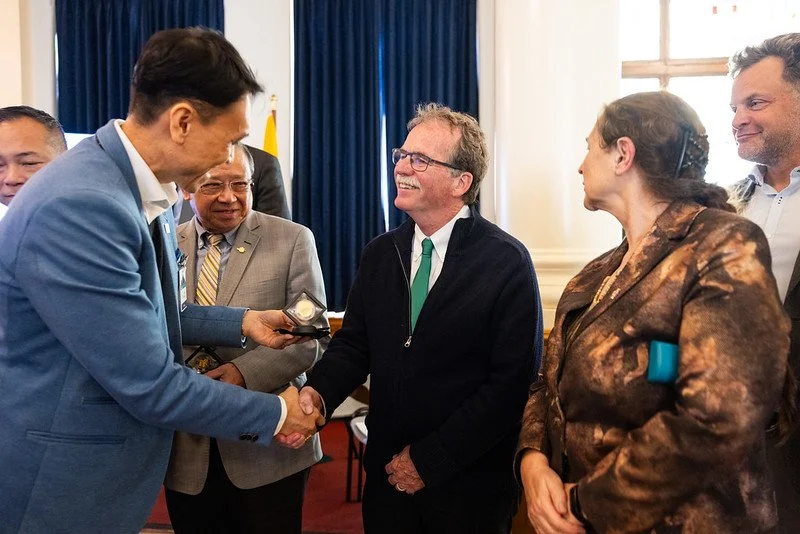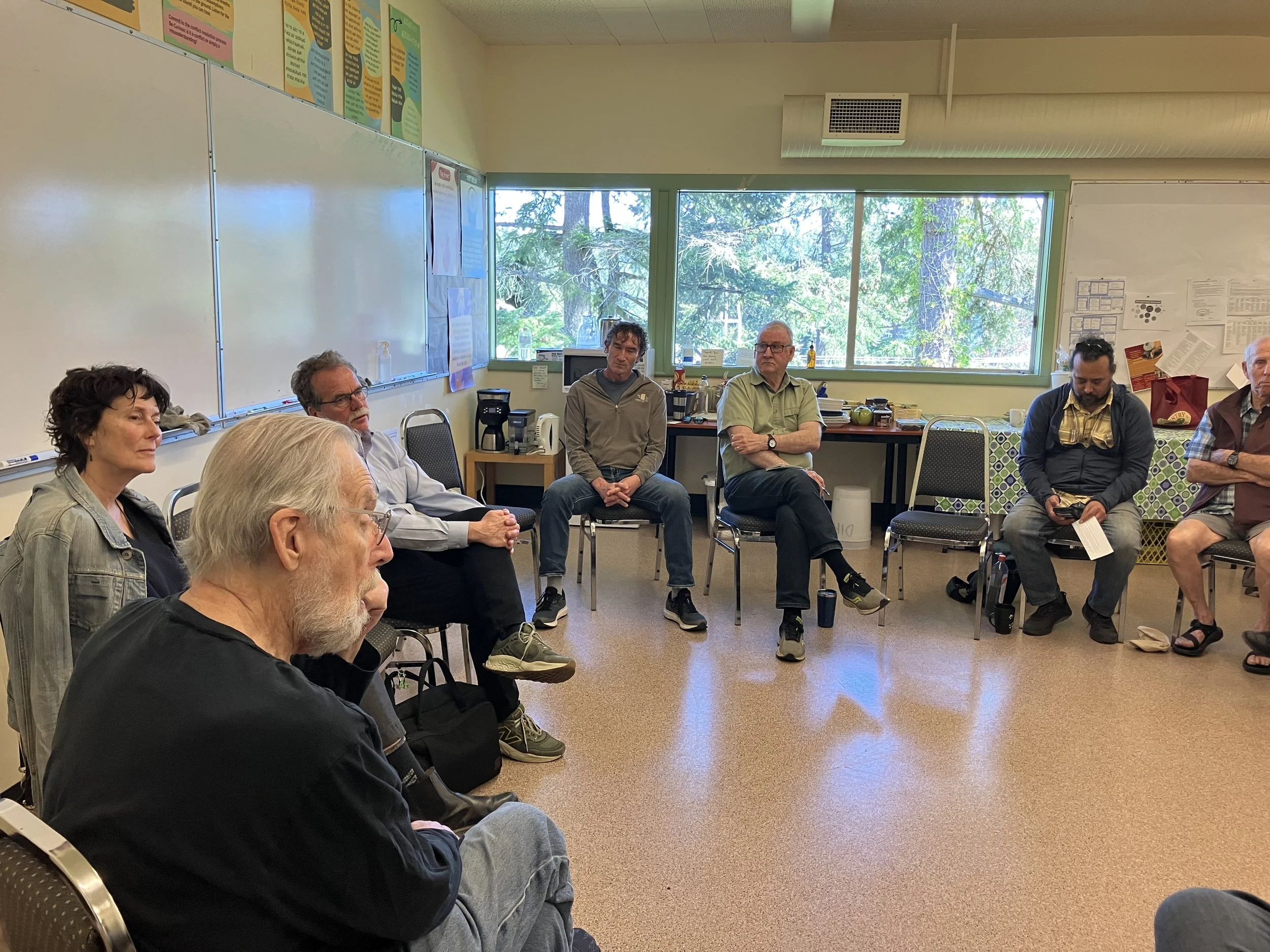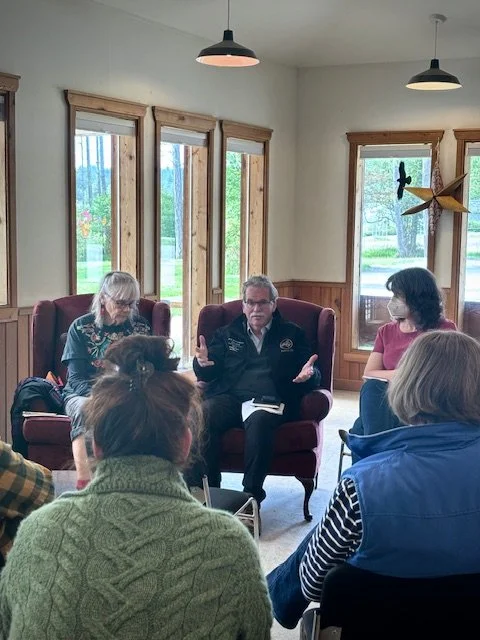MLA in ACTION – Issue #8
Week 1 – April 28 - May 2
Monday was a quiet day at the Legislature. In the aftermath of the Lapu Lapu Day Festival tragedy, the House convened, held a minute of silence to acknowledge the victims and adjourned until Tuesday. This day was also the annual National Day of Mourning to remember workers who have been injured and who have lost their lives at the workplace. At right is a speech I made to mark the day at a ceremony held by the Speaker of the House, Raj Chouhan.
The rest of the day was spent preparing for what will be a very busy session through to the end of May.
Tuesday was a good example of why I love being your MLA at the Legislature, as it gives me an opportunity to bring the best values to the fore on behalf of all you, my constituents. I’m also able to connect in lots of different ways with British Columbians making a difference.
The Legislature hosted scientists in an event known as Science Meets Parliament. Our Caucus hosted Dr. Kalindi Morgan who is researching the natural products waiting to be uncovered in the diverse ecologies of the northern boreal forests, and Professor Robert Godin who, along with his research group, “aims to make impactful contributions to worldwide efforts in developing sustainable photocatalysis.” Later in the day I had the opportunity to make remarks at a Speakers reception for the many scientists. It gave me a wonderful opportunity to highlight the importance of following the scientists as truth bearers in an age shaped by misinformation, polarization and politicized truths.
In the House, following deeply moving statements by Party Leaders in the aftermath of the Lapu Lapu Festival Tragedy, we shifted into question period where I highlighted the flaws of the “first past the post” system and questioned the government on its commitment to democratic and electoral reform. For example, did you know that the Bloc and the NDP each got 6.3 % of the vote federally, yet the Bloc got 22 seats while the NDP got 6 seats? . What was noteworthy about this question period was that it was a serious exchange of questions and answers, which is exactly what Question Period should be.
The government released its Climate Change Accountability Report, and I supported MLA Jeremy Valeriote as he held the government to account and quizzed Adrian Dix the Minister of Energy in Budget Estimates. The province is currently set to reduce emissions by just 18% by 2030, far below the legislated target of 40%.
Earlier in the day I attended Journey to Freedom Day, where we raised a flag to honour and commemorate the 50th anniversary of the mass migration of Vietnamese refugees at the end of the Viet Nam War. Afterwards we gathered in the Hall of Honour and I, along with other leaders, had the privilege of giving a speech in which I noted that the Vietnamese Refugee Crisis was the inspiration for Canada’s private sponsorship program. Vietnamese refugees and later waves of immigrants and refugees uplift communities across Canada.
Wednesday, I had the honour of introducing Olivia Hayne to the Legislature. Olivia is a constituent and most importantly a volunteer with BC Transplant. April is National Organ and Tissue Donation Awareness Month. After Olivia and her Family worked to facilitate the donation of her brother Alistair’s organs which saved the lives of five people, Olivia and her parents have been dedicated volunteers with BC Transplant. Thank you!
Budget estimates for the Ministry of Indigenous Relations and Reconciliation and committee clause by clause review of Bill 7 filled much of the rest of the day. Every step we take in all parts of the province to achieve Reconciliation after 150+ years is a welcome step, and we must all do our part.
On Thursday, we began our work in the Legislature in a good way by voting unanimously to make Suzie Seo’s appointment as Law Clerk and Parliamentary Counsel permanent, as well as making Artour Sogomonian’s appointment as Deputy Clerk of the Legislature permanent.
This week saw the introduction of Bill 14, the Renewable Energy Projects (Streamlined Permitting) Act and Bill 15, the Infrastructure Projects Act. We will closely examine the provisions of these two Bills and propose amendments where necessary to prevent government overreach. Specifically, efforts to expand oil and gas infrastructure or weaken essential environmental protections at a time of accelerating climate change. It is telling that both bills were designated as confidence votes, which means that if the Green Caucus and Conservative Caucus vote against the Bills leading to a tie vote with the NDP, then the Speaker can break the tie and presumably vote in support of passing the two Bills.
I also spent 2 hours asking the Minister of Housing and Municipal Affairs a range of questions related to housing generally, including specific questions related to the affordable housing crisis in our riding. You can check out Hansard to read the full transcript here.
Friday was an official day of mourning and remembrance for the victims of the Lapu Lapu Festival tragedy with a mass held at the Holy Rosary Cathedral in Vancouver – our Interim Green Leader Jeremy Valeriote attended.
My Friday was spent on Salt Spring Island. I caught the first ferry and began the day with a constituent meeting on health care and housing. After a helpful update on pending decisions regarding Baker Beach, I attended ASK where we had a wide-ranging session. In the afternoon I met with Laura Patrick, Deb Morrison and Gary Holman to discuss the Islands Trust, followed that up with a further constituent meeting, and then it was back to Swartz Bay where I zipped into Victoria to give some welcoming remarks to the 31st Island Youth Parliament. It was so great to see students between the ages of 14-18 actively engaged in a mock parliament, complete with a Speaker, introduction of Bills, and much more. The highlight was the enthusiastic desk thumping of our young parliamentarians when I mentioned that the All-Party BC Government Special Committee on Democratic and Electoral Reform will be, amongst other things, considering whether the voting age should be 16. Afterwards, I zipped back out from Mount Doug High School, caught the ferry to Pender Islands, with 5 cars to spare, and made it home!
Week 2 – May 3 - May 9
The Legislature reconvened on Monday, and it has been an action packed. The main item on Monday was budget estimates for the Ministry of Water Land and Resource Stewardship (WLRS). Participating in estimates provides an important opportunity to seek answers directly from the Minister on her vision for addressing critical issues such as watershed management across BC, as well as issues specific to the riding. Among the concerns we discussed were: dock management in the Southern Gulf Islands, where there are over 80 dock applications that have not been given a green light or red light, some since 2017; the devastating ecological impact of fallow deer on Mayne Island; big questions about the independence and integrity of environmental reviews to guide whether or not a permit will be issued for placing of 85 truckloads of gravel and boulders on the sensitive Baker Beach habitat on Salt Spring island.
In each case we were able to put these issues on the radar of the Minister for immediate action.
Tuesday was quite a day. I had breakfast with a member of the Special Committee on Democratic and Electoral reform – this work is a huge priority item for me – and finalized amendments to Bill 7 for consideration of the other parties. These amendments will increase openness and legislative oversight. I returned to the issue of mental health in Question Period to emphasize the need for health care professionals, not police, intervening to support people in mental health crisis. Afterwards, I participated in a wonderful lunch with a delegation from Washington State, including the Lieutenant Governor, Denny Heck and Senators Sharon Shewmake and Lisa Wellman. Good progress on establishment of a BC-WA Interparliamentary Exchange Group. More committee deliberations on Bill 7 and Ministry of Solicitor General estimates.
The 24 hours beginning at 8:45 pm on Tuesday was one for the history books. The NDP used a motion to force closure on all remaining legislation as of May 27. The NDP action limited debate on far reaching legislation by a margin of 2 votes. Needless to say, we voted against the measure but that was not enough, and we now have about 12 sitting days to deal with major legislation. We had proposed sitting to midnight and adding extra days.
Business carried on and the next morning MLA Valeriote and I participated in the Capital Bike Commuter Challenge. I was in my electric car and MLA Valeriote was on his bike and we raced from Uptown to the Legislature. I have to say that the 25 red lights slowed me down and MLA Valeriote won hands down!
Throughout the rest of the day, I met with the Special Committee on Electoral Reform to begin our work and participated in hours of committee deliberation on Bill 7, the Tariff response bill. And now the good news. The NDP and Conservatives supported two very important amendments I proposed to increase openness and provide for a standing special committee to provide legislative oversight to this far-reaching Act. It was unanimously passed. A great way to end a tumultuous 24 hours.
Speaking of electoral reform! “The Special Committee on Democratic and Electoral Reform will be seeking input this summer on democratic engagement, voter participation, and models for electing MLAs. Indicate your interest in presenting to the Committee at a public meeting by logging in or creating an account and completing the request form by May 29 at 2:00 p.m. (Pacific).” You can read more about the committee and create your account here.
Friday found me on the ferry once again, sailing back over to Pender to attend their monthly community meeting. Key topics of discussion were the importance of transparency and democratic accountability at both provincial and local levels, the Islands Trust mandate, and plans for ongoing community engagement. Following this, I had a great meeting with Pender Island Housing Society. Did you know that they have not been able to build additional senior housing since the 1980’s while the population on Pender has pretty much doubled? I also briefed constituents on Islands Trust issues and Health Care.
I was at the legislature until 9 p.m., which allowed me to hold meetings and make progress on several key items. These included meeting with fellow members of the All-Party Democratic and Electoral Reform Special Committee and the Committee Clerk, reviewing potential amendments to Bill 7—the Tariff Legislation—to promote openness, transparency, and legislative oversight, and preparing for budget estimates related to Housing and Municipal Affairs. All in all, a very productive day.
In my ongoing endeavour to write a monthly op-ed, please find, below, my most recent take on accountable governance in B.C
Democracy at Risk
Over the past month, the NDP government’s play book has become very clear – and it ain’t pretty.
On the one hand, legislation to repeal the Carbon Tax was passed in one day. On the other hand, the Legislature’s inability to move quickly, is used to justify three pieces of legislation that give unheard of powers to the NDP Cabinet:
Bill 7 - Economic Stabilization (Tariff Response) Act
Bill 14 - Renewable Energy Projects (Streamlined Permitting) Act
Bill 15 - Infrastructure Projects Act.
The NDP’s script for this unprecedented legislation is that it is anchored with a purpose supported by British Columbians, e.g., reducing interprovincial trade barriers, advancing renewable wind projects, building schools and hospitals. Then, in the name of addressing a crisis (Trump), the legislation gives unparalleled powers to Cabinet - without openness, transparency, or legislative oversight - not to mention Indigenous consultation, assessment and mitigation of impacts on the poor and accelerating climate change. The NDP Cabinet also gives itself the ability to use these powers and play favourites in areas that Cabinet, in its sole discretion, deems important. Just one example: new LNG projects.
Whether you agree or not with the government, in a democracy these types of decisions and measures are normally made by the Legislature, not Cabinet, where they are the subject of debate and oversight. Especially important when the Opposition Conservatives and Greens between them received 51.5% of the popular vote in the recent election.
With that in mind, the Green Caucus spent over two months, from the introduction of Bill 7 to the completion of the Committee review, pressing and securing changes to the Bill – including the removal of the most egregious power grab in Part 4 and securing amendments to require that all Cabinet decisions are publicly disclosed and reviewed by an all-party committee of the Legislature. Other amendments the Green Caucus secured were the requirement for interim and final oversight reports on the administration of the Act and, most importantly, the inclusion of a shortened sunset clause, repealing the legislation by no later than May 28. With these changes, the Green Caucus will be supporting final passage of Bill 7 before the end of May.
Having been taken through the ringer on Bill 7 you would think that the NDP government would learn from this experience and apply it to Bills 14 and 15. But you would be wrong. Instead, the government waited until late in the session to introduce Bill 14 and 15 without the safeguards now in Bill 7. To add insult to democracy injury, the NDP took advantage of a moment late one evening when 2 Opposition members were absent to invoke time allocation, a.k.a “closure”, which means that the final vote on Bills 7, 14, and 15 will occur by May 27, whether or not any necessary amendments are included and whether or not there has been fulsome debate of the Bills.
When you read this article, you may know the outcome of these politically expedient manoeuvres. But please be aware that the Green Caucus offered to sit until midnight, sit Fridays, sit through other breaks, and extend the Session into June to allow for proper consideration of this extraordinary legislation removing power from the Legislature and concentrating it in Cabinet.
When I reflect on these events, Naomi Klein’s Shock Doctrine comes to mind.
Democracy must be paid more than lip service in BC.
Rob Botterell, MLA for Saanich North and the Islands and Green Party House Leader
For further For further information and newsletters on my work as your MLA, please check out my website mlabotterell.ca.
Until next time,






